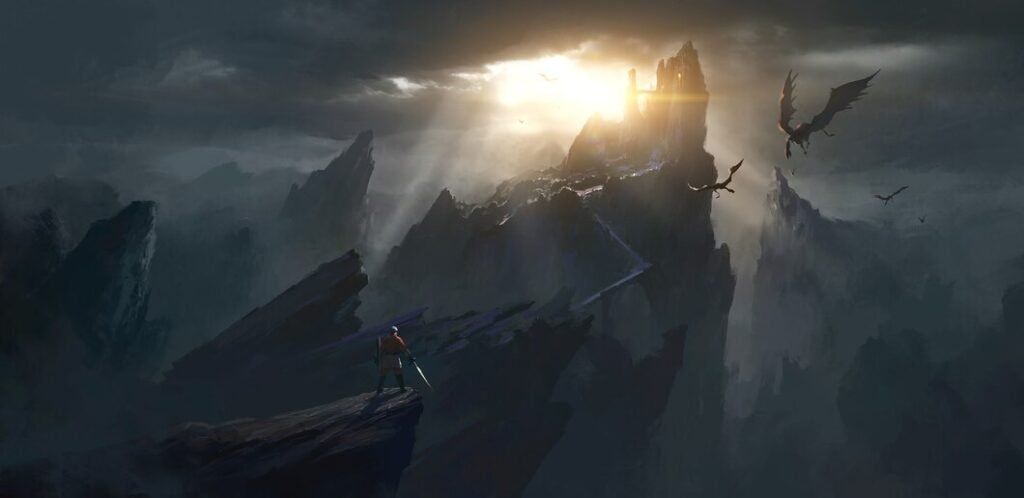
Introduction
Since its debut in 2011, Game of Thrones has captivated millions worldwide. Based on George R.R. Martin’s A Song of Ice and Fire series, the show has left an indelible mark on pop culture. With intricate characters, unexpected plot twists, and cinematic excellence, Game of Thrones pushed the boundaries of television. But what made it such a cultural phenomenon? Let’s explore.
1. The Allure of a Complex World
One of Game of Thrones’ defining features is its world-building. Westeros and Essos, the continents where the story unfolds, are rich with history, lore, and intricate social structures. Unlike many fantasy series, Game of Thrones doesn’t simply pit good against evil; it crafts a morally gray world where survival often requires compromise.
Political Intrigue: With families like the Starks, Lannisters, and Targaryens vying for power, the story weaves layers of political tension. Viewers are drawn into the shifting alliances and betrayals, feeling as though they are part of the action.
A Gritty Reality: Unlike classic high-fantasy, where heroes emerge unscathed, Game of Thrones presents a brutal, unforgiving world. This realism, combined with the unexpected deaths of beloved characters, created a sense of suspense rarely seen on television.
2. Characters We Love—and Love to Hate
Perhaps the show’s greatest strength lies in its characters. Each character is deeply flawed and multi-dimensional, from Jon Snow’s honor to Cersei Lannister’s ruthless ambition. Viewers are drawn to these characters because they are not just symbols or archetypes; they are human.
Iconic Heroes and Anti-Heroes: Characters like Daenerys Targaryen, Arya Stark, and Tyrion Lannister evolved over time, growing in unexpected ways. The show’s creators didn’t hesitate to make them face moral ambiguity, often leading to dark choices.
Villains with Depth: While Ramsay Bolton and Joffrey Baratheon became infamous for their cruelty, they were never portrayed as purely evil. We see glimpses of their motivations, making them more complex and unsettling.
3. The Impact of the Red Wedding and Other Shocks
Few shows have impacted audiences as Game of Thrones did with scenes like the Red Wedding. Moments like these left viewers shocked and emotionally shaken. By defying storytelling conventions, Game of Thrones kept fans on edge, ensuring they never became too comfortable.
Redefining Fantasy Tropes: The Red Wedding redefined what fans expected from a fantasy story. Instead of a hero’s victory, we were given heartbreak. This willingness to kill beloved characters became a defining trait of the show.
Unpredictable Endings: From Ned Stark’s execution to the explosive destruction of the Great Sept of Baelor, the show continually subverted expectations, making it feel fresh and daring.
4. The Role of Dragons and Magic
Magic in Game of Thrones is subtle and dark, yet pivotal. Dragons, once thought to be extinct, are revived by Daenerys, symbolizing the return of ancient powers to a world consumed by war. But magic is used sparingly, enhancing the story without overwhelming it.
Dragons as Symbols: Dragons serve not only as terrifying creatures but as symbols of power. As Daenerys’ dragons grow, so does her influence. Their presence adds an element of awe, connecting the story to a deeper fantasy tradition.
The White Walkers: Representing an ancient, supernatural threat, the White Walkers remind viewers of the ever-present danger beyond the Wall. Their enigmatic nature adds tension, contrasting the internal political conflicts with an external, existential threat.
5. The Cinematic Quality of the Show
From the costumes to the battle sequences, Game of Thrones raised the bar for television production. HBO invested millions, making each episode feel like a mini-movie. The result was visually stunning moments, from the grandeur of King’s Landing to the icy wastelands beyond the Wall.
Battle of the Bastards: This episode set new standards for battle scenes on television. With choreography, camera work, and raw intensity, it created a visceral experience that had fans holding their breath.
Attention to Detail: The meticulous costume and set designs helped build an immersive world. From the intricate designs of the Iron Throne to the sigils of each house, every detail helped convey the richness of Martin’s universe.
6. The Controversial Ending
![]()
The series’ final season was perhaps its most controversial. Fans had invested nearly a decade in the story, so the ending sparked intense debate.
Mixed Reactions: Many felt the character arcs were rushed and that certain developments, such as Daenerys’ descent into tyranny, were too abrupt. This polarizing finale became a defining aspect of the show’s legacy.
An Unfinished Legacy: Despite the backlash, the ending does not erase the groundbreaking journey that preceded it. Game of Thrones remains a significant achievement in television, with its final season sparking important discussions about storytelling and fan expectations.
7. The Cultural Legacy of Game of Thrones
Game of Thrones is more than a show; it’s a cultural touchstone. It’s influenced fashion, sparked travel to filming locations, and even led to spin-offs like House of the Dragon, which explores the Targaryen family’s tumultuous history.
Global Phenomenon: Fans worldwide connected through the show, creating a community that continues to discuss, dissect, and debate every aspect of Westeros.
Spin-offs and Future Projects: With House of the Dragon, HBO continues to explore Martin’s world, showing that the love for Westeros is far from over.
Conclusion
While Game of Thrones had a divisive ending, its impact on television and pop culture is undeniable. The show brought fantasy into mainstream conversation, challenging conventions and delivering some of the most memorable moments in TV history. Whether you’re a die-hard fan or a newcomer to Westeros, Game of Thrones remains a must-watch for anyone interested in complex storytelling and unforgettable drama.
Game of Thrones may be over, but its influence lives on. As we continue to explore the world of Westeros in future projects, we are reminded of the enduring power of a story well-told.






3 thoughts on “Game of Thrones: A Cultural Phenomenon”